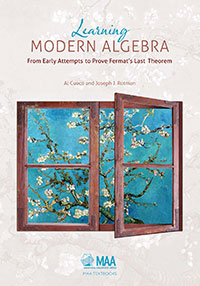 Authors Al Cuoco and Joseph J. Rotman recap their experiences of writing Learning Modern Algebra: From Early Attempts to Prove Fermat's last Theorem.
Authors Al Cuoco and Joseph J. Rotman recap their experiences of writing Learning Modern Algebra: From Early Attempts to Prove Fermat's last Theorem.
"About five years ago, I helped organize a conference at the University of Arizona focused on the mathematical preparation and professional development of secondary mathematics teachers. Consistent with the missions of the Institute for Mathematics and Education at UA and The Focus on Mathematics partnership in Boston (the sponsors of the event), we looked to invite an eclectic group of mathematicians, teachers, and mathematics educators. I had admired Joe Rotman’s writing for some time and had long wanted to hear more about his ideas on precollege education, ever since I visited Peter Braunfeld and colleagues at Urbana-Champaign, maybe 15 years ago. So we invited him and he accepted. Several of the presentations were, as Joe recounts in his post, attempts to make abstract algebra a more useful part of preparation for high school teachers. Like Joe, I was underwhelmed with much of what I heard. On the other hand, I had spent over two decades teaching high school, and I used ideas from number theory (especially Ireland-Rosen), algebra (of the Birkhoff Mac Lane variety), and other classic texts all the time to help bring some coherence and underlying structure to my high school courses. So, when Joe brought up the idea of a new text in this tradition, one that emphasizes rings and fields over groups, that puts experience before formality, and where abstract results emerge from concrete computations, I jumped at the chance to collaborate. And it’s been a very interesting collaboration. Yes, Joe made me crazy sometimes, but we gradually came to a common style and approach that got easier to negotiate as the chapters developed. Underneath, we really do share the same values, tastes, and dispositions. And I think part of the reason that we get along so well comes from the fact that we both enjoy a good calculation. By the way—I learned that it takes four times as long for two people to write a book as it does for one person. You can extrapolate what would happen with three authors." — Al Cuoco "About five years ago, I was invited to a meeting in Arizona about preparation of high school math teachers. I guess the reason for my being asked was a book I had written in the 90s, Journey into Mathematics, for a transition course between the usual first university calculus courses and the following math courses that take proofs seriously. The Arizona meeting was the first meeting of “educators” I had ever attended and, to tell the truth, I was quite the snob, sneering down my nose at guys who think they know how things ought to be taught. Well, I discovered that a lot of them are also very good mathematicians, and it might be worthwhile listening to them. One of the topics discussed was how abstract algebra courses designed for future high school math teachers affects what is actually taught in high schools. The standard of such a course is divided into three parts: number theory, group theory, and commutative ring theory. I was appalled by descriptions of how group theory was being shoe-horned into high schools, in the rare cases it is taught at all (but many other talks were pretty good). In an impromptu talk at the meeting, I began by saying that even though groups are my friends, in light of what I had been hearing, they should not be highlighted in high school. When I got home, I thought more about this, and I decided I could design an abstract algebra course for teachers that would be more useful than what is done now. But it’s been a long time since I’ve had any contact with high school math (except for sniffing at my daughter’s class when she was in a linear algebra course pretending to be Euclidean geometry). I met Al Cuoco in Arizona, and he knows high school curricula. I sent him an e-mail briefly describing my ideas, and asking whether he knew anyone knowledgeable about contemporary high school math who might share my ideas. He said, “What about me?” I was delighted, and our collaboration was born. What’s nice is that, in spite of disagreements along the way (I’m not sure how many times he said I drive him crazy), we essentially share the same values and also tolerate each other’s sense of humor. If anyone thinks we are too serious, we invite them to read the tale of Ricky the raccoon (p. 134). We hope that our work not only finds sympathetic readers, but that it can actually improve the way things are now done." — Joseph Rotman Interested in purchasing a copy? Order from the MAA Store or the MAA eBooks Store.
|
Friday, August 9, 2013
Cuoco and Rotman on Learning Modern Algebra
Subscribe to:
Post Comments (Atom)

No comments:
Post a Comment